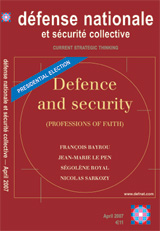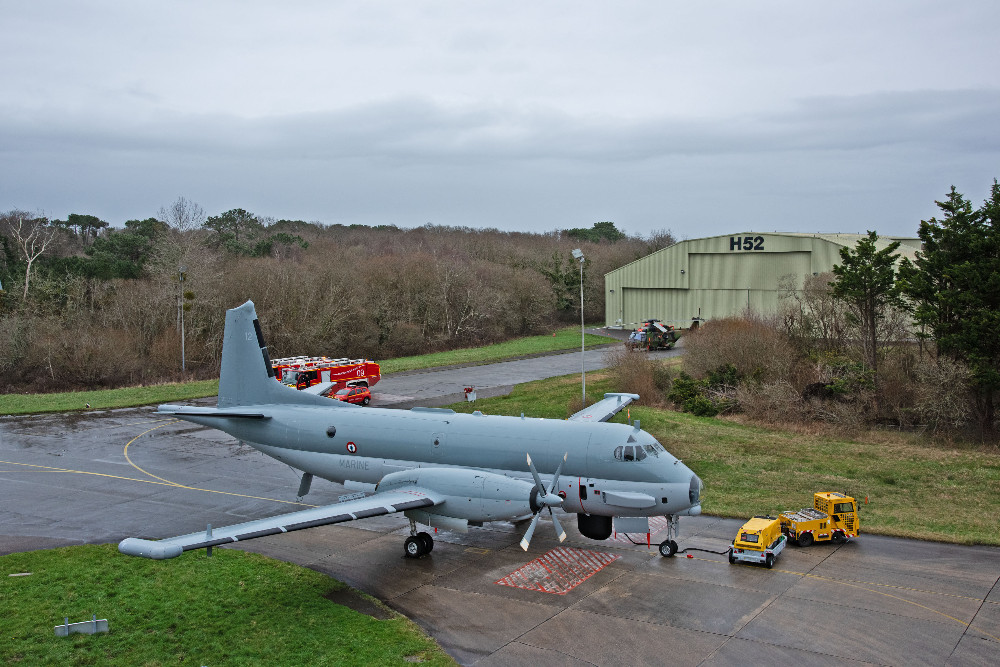Edition anglaise

April 2007 - n° 696
Profession of faith - François Bayrou
French defence policy
Profession of faith - Jean-Marie Le Pen
Replies to questions
Profession of faith - Ségolène Royal
A strong defence to preserve peace
Profession of faith - Nicolas Sarkozy
Our nation must continue to give high priority to defence
Questions from the maritime world to the presidential candidates - IFM-CMF
These questions are put by an ad hoc working group made up of various executives of the French Maritime Institute (IFM) and French Maritime Cluster (CMF). The political figures that emerge from the elections will be questioned as to their intentions and their first decisions, in the light of declarations made by the successful candidate on the same issues. This will be in November 2007 at the IFM National Sea Day (representing the Sea Party), and a summit meeting organised by the CMF (representing French merchant shipping).
Peace and defence - Jean-Louis Georgelin
Speech by General Jean-Louis Georgelin, Chief of Defence Staff, opening the 14th ‘Peace and Defence’ meeting of parliamentarians in Paris on 5 February 2007.
The effect of peace operations on the employment of the French Army - Les Sentinelles de l'Agora
French forces sent to maintain peace in crisis regions are committed without any political guidance other than keeping the peace, and under constraints which run contrary to fundamental strategic principles and tactics. Without policy guidance, this pacifist conception of force employment tends to lead to subtle deviations in the thinking of those political, intellectual and military elites who plan the military element of these commitments.
The structure of armed forces: striking the right balance between teeth and tail - Olivier Pons
The reality of today’s conflicts in Iraq and Lebanon faces us with the need to think about the structure of our forces. In France and in Western armed forces, the plans inherited from the Cold War, and pressure from NATO, have led us towards more compact structures for our forces, equipped above all for the higher end of the operational spectrum–with top-heavy command structures and lacking troops on the ground. What is the right balance between the fighting forces and the headquarters staffs–the teeth and the tail? What priorities should be given to equipments? The forces must have a greater capacity for light, mobile intervention while maintaining a powerful, if reduced, nucleus.
What is European defence? - Michel Scialom
Much talked about, European defence is basically the expression of an ambition within the wider framework of the building of the European Union. It can take pride in some tangible achievements, notably in the field, and it has led to some industrial collaboration. None the less, it cannot be considered as a fixed star in the firmament since it is constantly evolving within the dynamic perspective which is Europe. Providing that some institutional uncertainties can be resolved, and that complementarity with NATO acquires real meaning, it can only become stronger, based on what is already in place and on the contribution it can make to the peace and security of the Continent.
Charm-a new military strategy - Étienne Bommier
After the conquest of ground, that of minds; new issues will trigger power conflicts in the twenty-first century. We must urgently strengthen the link between strategy and culture, in order to be able both to charm and to influence.
The causes of the decline of France since 1815 - Roberto Nayberg
France has been in continuous decline since 1815. This article attempts to analyse the reasons why, making a distinction between those which derive from internal structural characteristics, those which are the result of external structural events, and (without going into irrelevant detail) those which are fortuitous. The first touch on demography, the economy, sociology and mentalities; the second on the spread of national feelings in their modern form in Europe, and then the world.
A model of civilisation - Élie Barnavi
The 4th Paris Forum, which took place at UNESCO from 10 to 12 February 2007, had as its theme ‘What Europe for what Europeans?’.In this summary, Élie Barnavi evokes the identity and thus the frontiers of Europe, before asking what sort of Europe we wish to build, and what its purpose should be.
The vexed question of an Israeli strike against Iran - Paul Giniewski
A nuclear Iran has become an increasingly contentious issue. In the light of Western impotence, many Israelis are calling for a preventive strike against a declared genocidal intention. According to Israeli analysts, without preventive military action production of an Iranian bomb is just a matter of time. Moreover, the annihilationist rhetoric used by Iran’s leaders, chiefly by President Ahmadinejad, is not a matter of sloganeering but indeed a programme, in which the destruction of Israel is indispensable for the attainment of Iran’s manifest destiny– the ‘Islamisation’ of the world. A quasi-consensus is emerging in Israel on the necessity of bombing Iranian nuclear installations. The scenario is still undefined.






_astronaut_Sophie_Adenot_(jsc2025e058846_alt).jpg)

